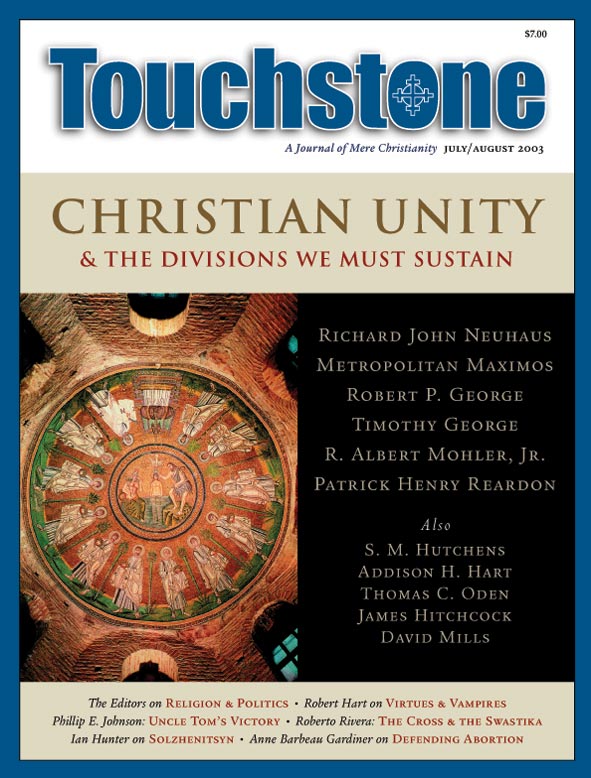“That They May Be One”
Prospects for Unity in the Twenty-First Century
by Richard John Neuhaus
“Christian Unity and the Divisions We Must Sustain” is a provocative title, and I think there are some divisions we must sustain. But I’ll also qualify a possible misunderstanding of that title. Let me start with a quote of Joseph Cardinal Ratzinger from 1988: “If one were to agree completely on regarding all the different confessions among Christians simply as human traditions, then one would have cut oneself completely loose from the question of Truth, and theology and theological dialogue would merely be a matter of diplomacy, of politics.” Then, this great sentence: “Our quarreling ancestors”—and he’s speaking particularly of the Protestant-Catholic divide—“were, in reality, much closer to one another when, in all their disputes, they still knew that they could only be servants of one Truth, which must be acknowledged as being as great and as pure as it has been intended for us by God.”
That’s profound, that even in their disputes, even as they were going for the jugular, indeed, even as, in the sixteenth and seventeenth centuries in the West, there were wars of religion of a most bloody sort, as difficult as it is for the worldly mind to grasp this, there was a deep unity because they knew what was at stake—namely, all the Truth that God intended for us.
Maximal Christianity & Truth
So there are divisions that, in an odd kind of way, do not violate our God-given unity. Certainly, there are arguments and contentions that must be prosecuted persistently, though not belligerently—winsomely, persuasively, lovingly always—but persistently and without compromise. For that great Truth that God intends for his people is at stake.
And yet, at least from the Catholic understanding, there ought not to be a division sustained at the altar. It is Christ’s intent that at the point that the Catholic Church understands to be, as the Second Vatican Council says, the source and summit of the church’s life—namely, the Holy Eucharist—there ought to be a visible unity that bears witness precisely to the fact that God in Jesus Christ is reconciling the world to himself. We are to be, in the language of Catholic ecclesiology, the sacramental sign, the effective sign of that reconciling work of God in Jesus Christ. That’s our Lord’s will; that’s the dominical fact of the matter.
Therefore, the actualization of our unity as a full eucharistic communion is uncompromisable. It’s worth noting that in the Second Vatican Council—which, as has been endlessly remarked, was not a doctrinal or dogmatic council but a pastoral council—there were no anathemas issued. But there is one anathema implicit at least. It is in the third article of the decree on ecumenism, which speaks about the divisions among Christians, the “damnable” divisions among Christians, say the council fathers. “Damnable” because they contradict the church’s purpose in the divine dispensation as the sacrament of the unity of all Christians as a sign of the promised unity of mankind. God is in Christ reconciling the world to himself.
Full communion in the Catholic understanding involves agreement in doctrine, in ministry, and in liturgy. That’s usually the triumvirate, keeping in mind that doctrine includes moral doctrine. But we are all agreed, in all our ecclesiologies, however construed, that the Christian community of faith is a community of sinners. Sinners forgiven, to be sure, and sinners by the grace of God on the way to further sanctification and responding to the universal call to holiness, but still sinners.
So we are still far from this goal of full communion, from this unity, which is part of the very gospel of Jesus Christ. Not simply a consequence of the gospel, certainly not a human construction of those who have been converted to it, but a constituent part of the gospel.
Thomas Oden speaks of the “new ecumenism.” It is breaking out in many different places and in many different ways—Touchstone, the Institute on Religion & Democracy (IRD), ReGeneration Quarterly—and it is to be encouraged and nurtured. It is a movement of the Holy Spirit. John Cardinal O’Connor once said, “I get up every day and pray that I’ll go to bed that night without having discouraged any impulse of the Holy Spirit.” Isn’t that a beautiful thing to be able to say?—a beautiful prayer. I even mentioned it one time to the Holy Father: “Cardinal O’Connor told me that he gets up every morning and prays that he’ll go to bed that night without having discouraged any impulse of the Holy Spirit.” The pope looked at me and said, “Oh, he told you that, did he?” I said, “Yes, isn’t that nice?” The Holy Father said, “I told him that.” Whoever’s line it is, it’s a great one.
subscription options
Order
Print/Online Subscription

Get six issues (one year) of Touchstone PLUS full online access including pdf downloads for only $39.95. That's only $3.34 per month!
Order
Online Only
Subscription

Get a one-year full-access subscription to the Touchstone online archives for only $19.95. That's only $1.66 per month!
bulk subscriptions
Order Touchstone subscriptions in bulk and save $10 per sub! Each subscription includes 6 issues of Touchstone plus full online access to touchstonemag.com—including archives, videos, and pdf downloads of recent issues for only $29.95 each! Great for churches or study groups.
Transactions will be processed on a secure server.
more from the online archives
calling all readers
Please Donate
"There are magazines worth reading but few worth saving . . . Touchstone is just such a magazine."
—Alice von Hildebrand
"Here we do not concede one square millimeter of territory to falsehood, folly, contemporary sentimentality, or fashion. We speak the truth, and let God be our judge. . . . Touchstone is the one committedly Christian conservative journal."
—Anthony Esolen, Touchstone senior editor









